As we prepare to write this, we sit in silence, simultaneously furious and sad. Sad because a woman we would like to call a comrade-in-arms has met with a huge injustice and furious because we live and work in a community that not only makes that kind of injustice possible, but that makes it probable.
Hours ago, Alison Rapp was fired by Nintendo of America. Fired because she was another feminist voice in the dark that sought to make our community better and fired because hers was a voice that GamerGate wanted to silence (though, as a darkly humorous aside: some of what she has said could actually be considered supportive of their calls for less aggressive localization).
Alison’s tweets over the last few weeks and months, since she’s found herself a target, have been horrifying to watch. We’ve watched as she has talked about taking safety measure with her family, as she has suffered attempted hackings on various online platforms, as she has been harassed, threatened, and labeled a “potential pedophile” (and worse).
Why has this been happening to Rapp? Because she is a vocal feminist working in the games industry, and it just so happened that she worked as a marketing person in Nintendo’s Treehouse, the division that handles games localization in the US. And the latest axe to grind with Nintendo and its localization was honed by cries of censorship against Nintendo based upon facts such the removal of an optional costume and a “boob slider” from Xenoblade Chronicles X (meaning that you could no longer make the 13-year-old Lin’s breasts as large as you would like, or put her into an optional bikini), the removal of the face petting mini game in Fire Emblem Fates, and adding coverage to the costumes to the characters in Bravely Default and the upcoming Bravely Second (and making the characters legally adult in the US).
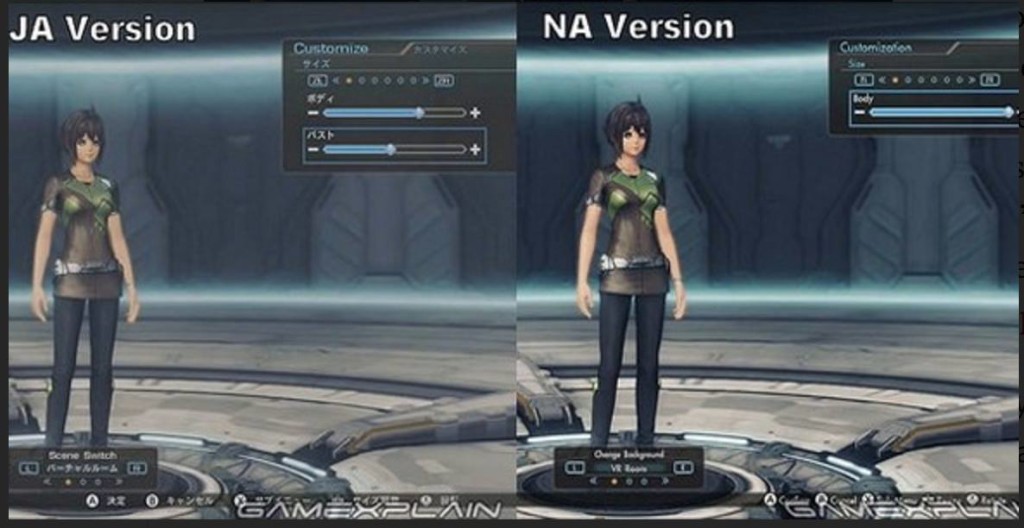
Ironically one of the things that GG used as proof that Rapp is a “potential pedophile” was the fact that she had written a paper (“Speech We Hate: An Argument for the Cessation of International Pressure on Japan to Strengthen Its Anti-Child Pornography Laws”) while she was an undergraduate student at Augsburg College that sought to explain the cultural differences between the construction of childhood and sexuality in American and Japanese cultures.
Admittedly it is not the most nuanced of arguments, but her argument is not one that has not been made before. It is neither pro-pedophilia nor pro-child pornography. It is more simply a senior thesis paper that seeks to explore cultures and possibilities. It is the work of a passionate, but young scholar-in-training. Within the paper, Rapp argues that possession of child pornography does not necessarily correlate to physical abuse, and draws a clear distinction between possession and fostering creation. She’s not alone in these kinds of arguments; an entire section of the paper is given over to a literature review of studies that examine the same issues from various angles. She does not advocate for pornography, as has been said, but instead promotes a stance centered on recognizing “the complexity of the media and the debates regarding its creation, distribution, and possession. Child pornography is not the cause of societal issues regarding children, and its total eradication should not be considered a solution of these ills.” Mostly, she argued that Japanese culture should not automatically fall in line with Western thought without careful consideration, and that’s not a new argument, either; in fact, it’s one we often hear in GamerGate circles.
But that’s not how the paper was painted; an organized campaign of tweets, part of the hashtag campaigns #TorrentialDownpour and #FireAlisonRapp, among others, simply called Rapp a “pedo” or a “pedo supporter”; images of her face were turned into memes about child sex, and repeated calls for people to call Nintendo and “report her” washed over social media platforms. Many of the tweets and other images simply repeated the above claims about pedophilia, as seen here, while others—not linked, not included—were part of an even more blatant, horrifying smear campaign, as images of Rapp were captioned with accusations of sexual assault, incest, and the advocation of racism and genocide.



The planning for #TorrentialDownpour on 8chan and 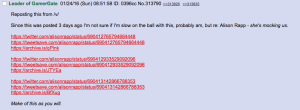 KotakuInAction included information about changes, proposed and rumored, to Fire Emblem Fates, audience, localization issues, and more, with users calling for information from all quarters, the creation of infographics, photoshops and anything that could be used to call attention to the cause. Several users also worked to archive Rapp’s tweets, as they were following her social media activity closely, saying she was “mocking” them, and that, too, may have made her a target.
KotakuInAction included information about changes, proposed and rumored, to Fire Emblem Fates, audience, localization issues, and more, with users calling for information from all quarters, the creation of infographics, photoshops and anything that could be used to call attention to the cause. Several users also worked to archive Rapp’s tweets, as they were following her social media activity closely, saying she was “mocking” them, and that, too, may have made her a target.
Alison Rapp’s story is not new. We have seen this level of harassment before. We have seen women threatened out of the industry or terminated by their employers because they had just become too much “trouble.” It’s become so common that Kotaku’s Patrick Klepek has identified the specific pattern these campaigns follow: “discredit, harass, shame, isolate, maybe find a skeleton in a person’s closet that calls their reputation into question.” That’s what’s happened here, with the added bonus of outright lies throw into the mix, and now another woman in the industry has been punished, fired by a company that never spoke out through the months of harassment she faced, and has only now drummed up a reason to speak out (some 60,000 trending tweets later).
This pattern of campaigning is unfortunately not something that we only see in the games industry. These are campaigns that we have seen levied against women who speak about games in a way that is informed by feminism across industries. Journalists, critics, and professors who seek to analyze and improve games and the experience in the games community for all kinds of people (not just the vocal minority). These campaigns involve incessant attacks on social media, threats via email and other messaging services, calls to HR if you are in industry and upper administration if you are in the academy (because a university has never fired a woman for being feminist, right?), doxxing, and worse. These are strategies that are found to be most effective because of the specific threat that they pose forwomen. Women who are already in tentative positions...simply because they are women.
But all this begs the question of: why Rapp? Why was she blamed for changes during localization, when she was a part of the PR team? Was it just because she was vocal on social media? Because she was deemed an easy target? Her tastes and research seem more in line with preserving some of the very changes that were (ostensibly) the primary subjects of the GamerGate hashtag campaigns: lessening changes from Japanese versions of the games. Preserving Japanese culture.
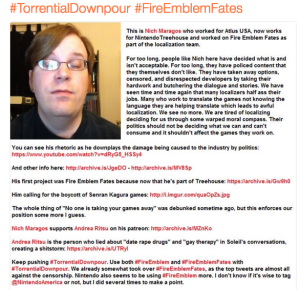 Turns out she’s not been the only target. There have been tweets about Rapp’s now-former colleague Nich Maragos, moreso now that Rapp herself has been terminated, but maybe Rapp was just the easiest target, or the one most campaigners preferred. There’s no #FireNichMaragos campaign, after all. Just a handful of tweets and images, not like the social media storm that swirled around Rapp. Maybe it was just misinformation; some participants had her pegged as holding all sorts of positions within Nintendo’s Treehouse, and most were wrong. But something drew the crowds to the outspoken, frank Rapp… and every “win” for the harassers inspires new efforts.
Turns out she’s not been the only target. There have been tweets about Rapp’s now-former colleague Nich Maragos, moreso now that Rapp herself has been terminated, but maybe Rapp was just the easiest target, or the one most campaigners preferred. There’s no #FireNichMaragos campaign, after all. Just a handful of tweets and images, not like the social media storm that swirled around Rapp. Maybe it was just misinformation; some participants had her pegged as holding all sorts of positions within Nintendo’s Treehouse, and most were wrong. But something drew the crowds to the outspoken, frank Rapp… and every “win” for the harassers inspires new efforts.
As we sit here writing and talking about Alison Rapp, Nintendo, and the culture of harassment that follows women working in the games industry, Nintendo has released a statement that claims that Rapp was terminated not because of the harassment campaign, but because she had a second job.
Though Ms. Rapp’s termination follows her being the subject of criticism from certain groups via social media several weeks ago, the two are absolutely not related. Nintendo is a company committed to fostering inclusion and diversity in both our company and the broader video game industry and we firmly reject the harassment of individuals based on gender, race or personal beliefs. We wish Ms. Rapp well in her future endeavors.
Simple, right? Has nothing to do with the hashtag campaigns, right? Totally her bad, whoops, she broke policy and now she’s fired. Right? According to a lot of folks right now, yes, that’s right. But nothing about this situation is that simple. Rapp, who initially said she would not give details, and encouraged people to support the folks at Nintendo, returned to social media to offer clarification after Nintendo’s statement… and that’s just the first indication that things maybe weren’t as cut and dried as Nintendo made them out to be.
Rapp, on Twitter (as part of this storify set), says she indeed worked a second job under a pseudonym, something she claims is acceptable under Nintendo’s policy. Looking at Nintendo’s Code of Conduct online we see that the only language that suggests that moonlighting only becomes a problematic for the company when it is a (vague, amorphous) Conflict of Interest. But the timeline to Rapp’s termination seems to suggest something else. Rapp mentions that that while she was on vacation the campaign of harassment against her ramped up and after returning to work she was “laterally moved” from her public position of Product Marketing Specialist to a less visible position and over the last couple of weeks things have become progressively worse for her until today when she was terminated for no longer being a safe representative of the company. I don’t know about you, but this does not read as “look we just found out about your moonlighting today” (and not only because Rapp herself said that the GamerGate actions caused greater scrutiny of her social media activity), and for these reasons we’re calling bullshit.
Conflicts of Interest
It is Nintendo’s policy to conduct its business affairs ethically, fairly, and impartially. It is the responsibility of all employees, officers, and directors to avoid situations that are, or could be construed as, conflicts of interest or inappropriate attempts to influence business decisions. To that end, Nintendo prohibits its employees from accepting any gift of more than nominal value or entertainment that is more than a routine social amenity in that it could be, or could appear to be, an attempt to influence the recipient into favoring a particular customer, vendor, consultant, or other outside entity.
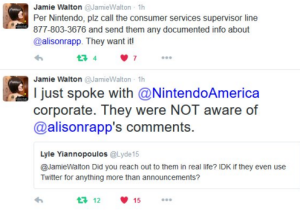
In the end is what is most disconcerting about Nintendo’s treatment of Rapp is not just their caving to the pressure of a vocal minority, but the fact that this campaign against Rapp has been ongoing and that rather than stand up for one of their own employees (in this family friendly/family centered corporation) they left her to the wolves. Not once did they acknowledge that as a marketing person she had no role in localization and had not “censored games.” It simply was not even a power that she possessed in her position (nor is it a power that a single person has on a localization team). No, Nintendo received hundreds, maybe thousands of messages demanding they fire a “pedo-apologist” immediately, and so someone, somewhere, decided it was time for action… and not the kind of action that defends employees under fire. While we may never know all the nuances of this situation, and all the details of what happened, or how events were weighed, one thing is clear: Rapp was targeted (incorrectly) because she was a visible, outspoken women on social media, who worked in gaming, and that targeting shined a spotlight on her that likely played a factor in her termination.

And why has this happened? Because she was mistargeted as a member of a localization team, or someone claimed she had more authority than she did? Because a group of angry Redditors and channers didn’t like her tweets, or her undergrad research, or her argument in her master’s thesis that marginalization of bronies reinforces gender norms? All that, but also: this happened because they could set a goal and strategize ways to achieve it.
But that goal impacts someone’s life and livelihood, and we need to remember that. Alison Rapp is a person, and this is her life. This is not a boss battle; no epic loot drops when she falls. Words and actions have real world repercussions. And it is infuriating that this continues to happen unchecked to women in and around the video game industry.


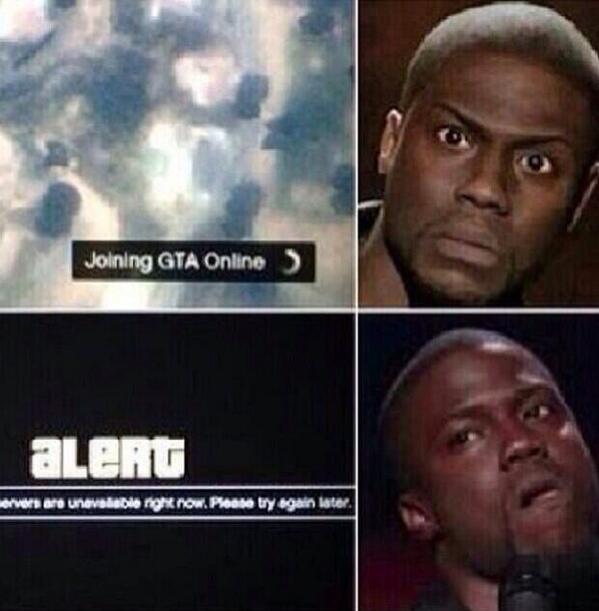

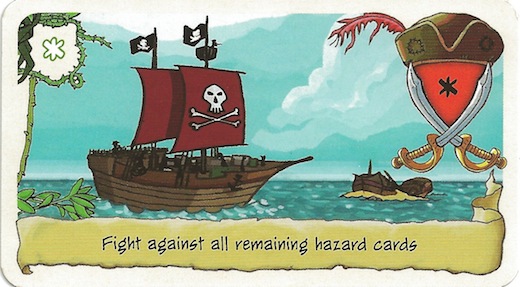
3 thoughts on “Another Woman, Another Loss: Nintendo Terminates Alison Rapp”
This article entirely ignores that Nintendo’s statement said their firing had nothing to do with gamergate, but had everything to do with her moonlighting as an adult model, posting softcore pornography to her Nintendo public relations account.
That ain’t family friendly actions.
1) It ignores the statement that is in fact actually included in the text?
2) rumors and slut-shaming, oh my! Wanna pull another and go for the trifecta?
These aren’t exactly rumors, she posted and linked to the softcore photos on her public twitter, photos which included Nintendo products and IP. The “psuedonym” she was working under was the just her twitter handle, the same one used as a Nintendo employee.
The instagram photos are still up, we know this because she shared them with all her followers in an effort to sell them. I could link to it you need it, but I don’t know if that would violate any rules.